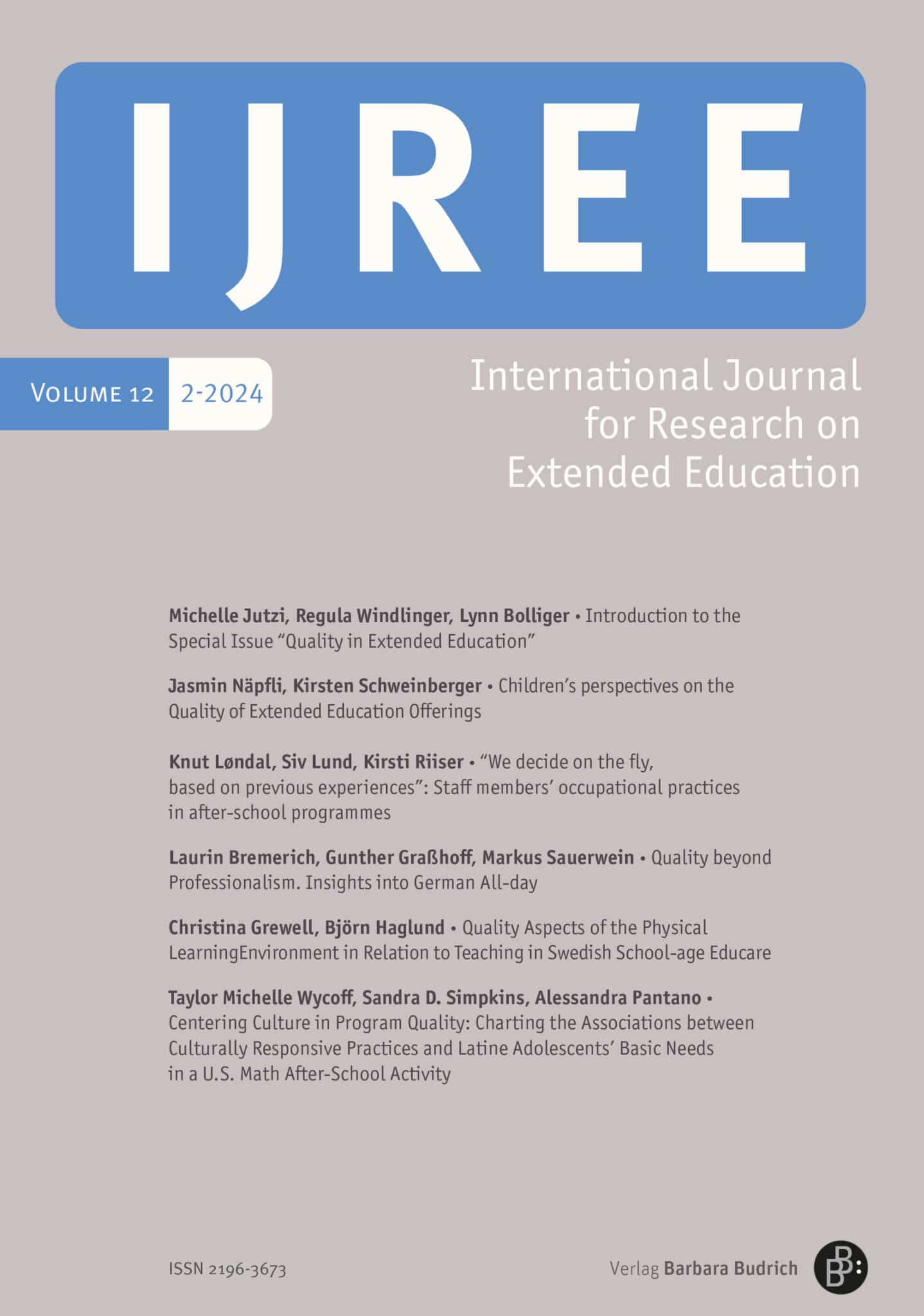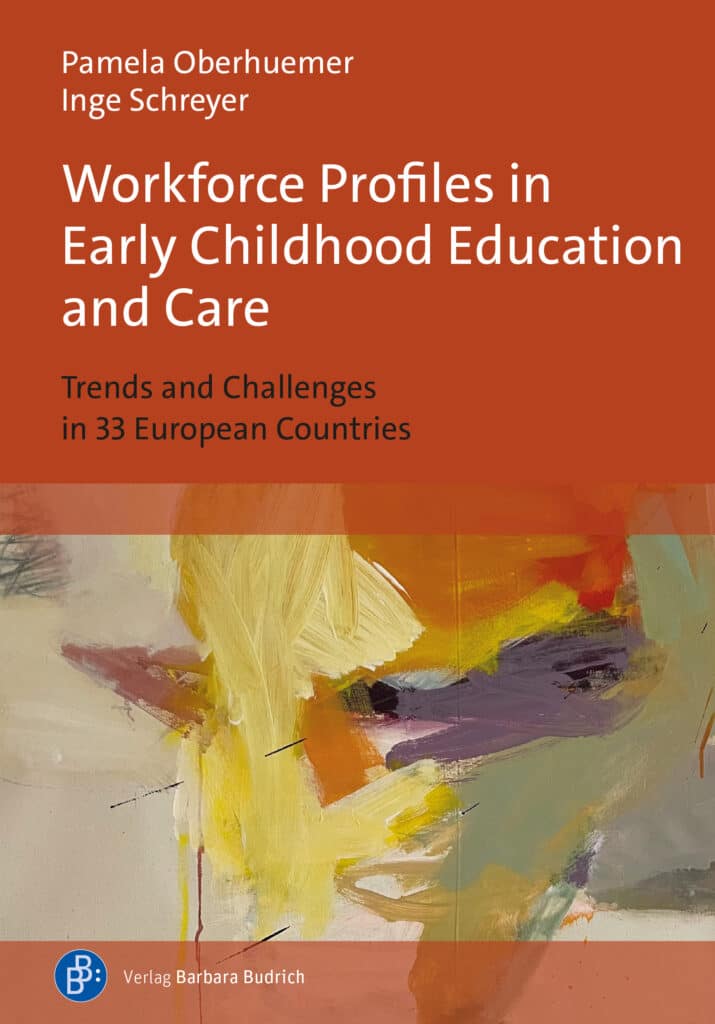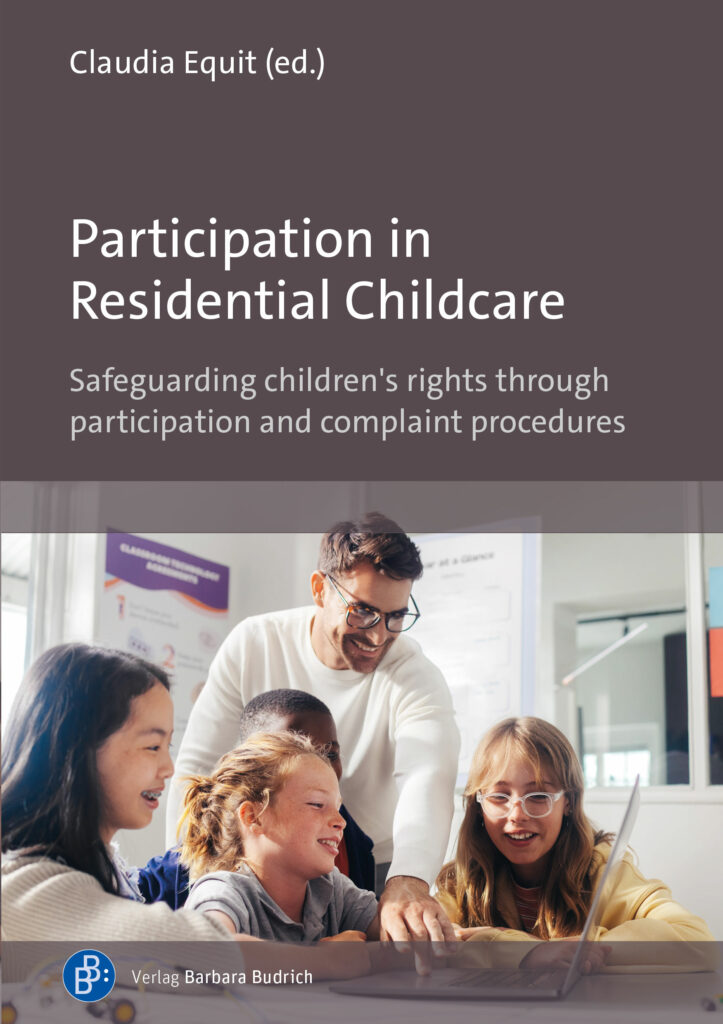Informationen zur Zeitschrift
Startseite » Programm » IJREE 2-2024 | Quality in Extended Education
IJREE 2-2024 | Quality in Extended Education
Erscheinungsdatum : 17.04.2025
35,00 €
- Inhalt
- Bibliografie
- Produktsicherheit
- Zusatzmaterial
- Bewertungen (0)
- Autor*innen
- Schlagwörter
- Abstracts
Inhalt
IJREE – International Journal for Research on Extended Education
2-2024: Quality in Extended Education
Sang Hoon Bae: Editor’s Preface
Special Section
Michelle Jutzi / Regula Windlinger / Lynn Bolliger: Introduction to the Special Issue “Quality in Extended Education”
Jasmin Näpfli / Kirsten Schweinberger: Children’s perspectives on the Quality of Extended Education Offerings
Knut Løndal / Siv Lund / Kirsti Riiser: “We decide on the fly, based on previous experiences”: Staff members’ occupational practices in after-school programmes
Laurin Bremerich / Gunther Graßhoff / Markus Sauerwein: Quality beyond Professionalism. Insights into German All-Day Schools
Christina Grewell / Björn Haglund: Quality Aspects of the Physical Learning Environment in Relation to Teaching in Swedish School-age Educare
Taylor Michelle Wycoff / Sandra D. Simpkins / Alessandra Pantano: Centering Culture in Program Quality: Charting the Associations between Culturally Responsive Practices and Latine Adolescents’ Basic Needs in a U.S. Math After-School Activity
Download of single articles (Open Access/fee-based): ijree.budrich-journals.com
You can register here for the IJREE alert.
Einzelbeitrag-Download (Open Access/Gebühr): ijree.budrich-journals.com
Sie können sich hier für den IJREE-Alert anmelden.
Zusätzliche Information
| Verlag | |
|---|---|
| ISSN | 2196-3673 |
| eISSN | 2196-7423 |
| Jahrgang | 12. Jahrgang 2024 |
| Ausgabe | 2-2024 |
| Erscheinungsdatum | 17.04.2025 |
| Umfang | 104 Seiten |
| Sprache | Englisch |
| Format | 17 x 24 cm |
| DOI | |
| Homepage |
Zusatzmaterial
Table of Contents / Inhaltsverzeichnis
Extracts / Leseproben
Autor*innen
Schlagwörteradolescents, after-school, after-school programme, all-day schools, April 2025, children’s perspective, culturally responsive, extended education, occupational practices, premises, professionalism, program quality, psychological ownership, qualitative network analysis, quality, quality in extended education, self-determination theory, staff member, staff perspectives, staff qualification, structuration theory, Teaching, well-being
Abstracts
Children’s perspectives on the Quality of Extended Education Offerings (Jasmin Näpfli, Kirsten Schweinberger)
The intended effects of Extended Education Offerings (EEOs) depend on their quality and structure. As a result, there is an increasing focus on examining concepts of quality in extended education. Children’s views on the quality of EEOs can differ from those of adults, as they have specific knowledge about EEO. This study investigates children’s views on quality aspects of EEOs to obtain a solid background from which a learning environment can be created conducive to the promotion of children’s well-being. The database for this article consists of 46 photo tours and group interviews with 194 children participating in nine different EEOs in one Swiss canton. Based on the CIPO model, the results indicate that the main dimensions of process quality are: relationships, autonomy, and participation. Structural aspects are mentioned less frequently, but ensuring sufficient space for a variety of needs is important for children’s well-being. Keywords: extended education, quality, children’s perspective, well-being
» Buy Single Contribution (Budrich Journals) / Einzelbeitrag kaufen (Budrich Journals)
“We decide on the fly, based on previous experiences”: Staff members’ occupational practices in after-school programmes (Knut Løndal, Siv Lund, Kirsti Riiser)
Research indicates that high-quality after-school programmes (ASPs) can offer good care and foster academic and socio-emotional development in children. Staff has been identified as a critical factor in ensuring quality of ASPs. This article explores how Norwegian ASP staff members consider their occupational practices and analyses whether the group working in ASP can be considered a profession. Focus group interviews among staff members at seven ASPs were conducted, and theory of professions made up the theoretical perspective. The results suggest that the staff members’ occupational practices were based on their perceived mandate as caregivers and facilitators of activities for the children. Although the work communities were described as collaborative, the staff members’ occupational practices during ASP are described as individualised. The practices are decided “on the fly” and are derived from practical knowledge and shared occupational values established in everyday experiences rather than from practical syntheses that also include theoretical reflections and research-based discussions among colleagues. The results indicate a lack of practical syntheses that characterise professionalism and reveal a need for professionalisation among Norwegian ASP staff. The study demonstrates the importance of professional competence among ASP staff and indicates a need to introduce qualification requirements for employment in ASPs. Keywords: After-school programme, staff member, occupational practices, professionalism, quality
» Buy Single Contribution (Budrich Journals) / Einzelbeitrag kaufen (Budrich Journals)
Quality beyond Professionalism. Insights into German All-Day Schools (Laurin Bremerich, Gunther Graßhoff, Markus Sauerwein)
The research project “LAKTAT – Non-Professionals in German All-Day Schools: Qualifications, Orientations, Institutional Integration” examines the role and impact of nonprofessional staff in all-day schools, focusing on their pedagogical orientations and organizational integration. The study explores critical questions: How does a sense of belonging influence knowledge about the quality of after-school activities? What factors contribute to a sense of belonging? How do staff cope with the lack of belonging? A mixed-methods design was employed in the research, integrating quantitative data from Sub-study A and network analyses from Sub-study B. Sub-study A evaluated the socio-spatial level of educational personnel, taking into account demographic characteristics and the influence of belonging on quality knowledge. Sub-study B examines cooperation and networking among staff. The findings indicate that engagement is a significant predictor of quality knowledge, while age is negatively correlated with it. Work experience and full-time employment do not have a significant impact on engagement. These findings underscore the importance of fostering a sense of community and engagement among non-professional staff to improve the quality of afterschool programs. The study provides valuable insights into the need for multi-professional collaboration and institutional support to improve educational outcomes in all-day schools. Keywords: All-Day Schools, Extended Education, Staff Qualification, Quality in Extended Education, Qualitative Network Analysis
» Buy Single Contribution (Budrich Journals) / Einzelbeitrag kaufen (Budrich Journals)
Quality Aspects of the Physical Learning Environment in Relation to Teaching in Swedish School-age Educare (Christina Grewell, Björn Haglund)
The curriculum states that Swedish school-age educare (SAEC) should offer students a meaningful leisure time and stimulate their development and learning through SAEC teaching, which is defined as a combination of care, development, and learning. In recent decades SAEC has relocated from a social to an educational arena with a different governance, teacher qualifications, terminology, physical location, and integration within schools (Boström & Augustsson, 2016). Studies have highlighted problems related to the conditions of the physical learning environment (Boström & Augustsson, 2016; Lager, 2020), although the empirical research in this field is limited. The aim of this study is therefore to investigate how the physical learning environment, from a staff perspective, enables or limits teaching in four SAEC centers. This is important, in that according to Harms et al. (2014), pedagogical quality in extended educational settings arises in interaction between features that include physical, organizational, and social aspects. The study concludes that regionalization, dimensioning, layout of the premises, and organizational aspects, together with the staff’s psychological ownership and/or subordination, have a clear impact on the nature and quality of teaching, the staff’s opportunities to develop their teaching, and the students’ possible choices and activities. Keywords: extended education, premises, psychological ownership, structuration theory, teaching, staff perspectives
» Buy Single Contribution (Budrich Journals) / Einzelbeitrag kaufen (Budrich Journals)
Centering Culture in Program Quality: Charting the Associations between Culturally Responsive Practices and Latine Adolescents’ Basic Needs in a U.S. Math After-School Activity (Taylor Michelle Wycoff, Sandra D. Simpkins, Alessandra Pantano)
Scholars have increasingly argued that we need to attend to adolescents’ race, ethnicity, and culture in after-school activities to ensure positive effects. Still, little is known about adolescents’ perceptions of culturally responsive practices in after-school activities (i. e., the use of diverse teaching practices, cultural engagement, and affirming diverse language preferences), including whether they are stable over time and beneficial to Latine adolescents, who are minoritized in U.S. society. Theoretically, culturally responsive practices are expected to help after-school activities meet adolescents’ three basic needs as conceptualized by self-determination theory: autonomy, competence, and relatedness. Findings based on 134 Latine adolescents (53% girls, Mage =11.74 years) participating in an afterschool math enrichment activity suggest adolescents’ perceptions of culturally responsive practices in the activity were moderately stable from winter to spring. There were no significant differences in adolescents’ perceptions of culturally responsive practices based on gender or preferred language (i. e., English or Spanish), and significant positive associations emerged between adolescents’ perceptions of diverse teaching practices and their feelings of autonomy, competence, and relatedness. This study offers insights for future theory development in the after-school field, particularly in the context of program quality, culturally responsive practices, and their implications for adolescent development and well-being. Keywords: program quality, culturally responsive, after-school, extended education, self-determination theory, adolescents
» Buy Single Contribution (Budrich Journals) / Einzelbeitrag kaufen (Budrich Journals)
Inhalt
Inhalt
IJREE – International Journal for Research on Extended Education
2-2024: Quality in Extended Education
Sang Hoon Bae: Editor’s Preface
Special Section
Michelle Jutzi / Regula Windlinger / Lynn Bolliger: Introduction to the Special Issue “Quality in Extended Education”
Jasmin Näpfli / Kirsten Schweinberger: Children’s perspectives on the Quality of Extended Education Offerings
Knut Løndal / Siv Lund / Kirsti Riiser: “We decide on the fly, based on previous experiences”: Staff members’ occupational practices in after-school programmes
Laurin Bremerich / Gunther Graßhoff / Markus Sauerwein: Quality beyond Professionalism. Insights into German All-Day Schools
Christina Grewell / Björn Haglund: Quality Aspects of the Physical Learning Environment in Relation to Teaching in Swedish School-age Educare
Taylor Michelle Wycoff / Sandra D. Simpkins / Alessandra Pantano: Centering Culture in Program Quality: Charting the Associations between Culturally Responsive Practices and Latine Adolescents’ Basic Needs in a U.S. Math After-School Activity
Download of single articles (Open Access/fee-based): ijree.budrich-journals.com
You can register here for the IJREE alert.
Einzelbeitrag-Download (Open Access/Gebühr): ijree.budrich-journals.com
Sie können sich hier für den IJREE-Alert anmelden.
Bibliografie
Zusätzliche Information
| Verlag | |
|---|---|
| ISSN | 2196-3673 |
| eISSN | 2196-7423 |
| Jahrgang | 12. Jahrgang 2024 |
| Ausgabe | 2-2024 |
| Erscheinungsdatum | 17.04.2025 |
| Umfang | 104 Seiten |
| Sprache | Englisch |
| Format | 17 x 24 cm |
| DOI | |
| Homepage |
Produktsicherheit
Zusatzmaterial
Zusatzmaterial
Table of Contents / Inhaltsverzeichnis
Extracts / Leseproben
Bewertungen (0)
Bewertungen
Es gibt noch keine Bewertungen.
Autor*innen
Autor*innen
Schlagwörter
Schlagwörteradolescents, after-school, after-school programme, all-day schools, April 2025, children’s perspective, culturally responsive, extended education, occupational practices, premises, professionalism, program quality, psychological ownership, qualitative network analysis, quality, quality in extended education, self-determination theory, staff member, staff perspectives, staff qualification, structuration theory, Teaching, well-being
Abstracts
Abstracts
Children’s perspectives on the Quality of Extended Education Offerings (Jasmin Näpfli, Kirsten Schweinberger)
The intended effects of Extended Education Offerings (EEOs) depend on their quality and structure. As a result, there is an increasing focus on examining concepts of quality in extended education. Children’s views on the quality of EEOs can differ from those of adults, as they have specific knowledge about EEO. This study investigates children’s views on quality aspects of EEOs to obtain a solid background from which a learning environment can be created conducive to the promotion of children’s well-being. The database for this article consists of 46 photo tours and group interviews with 194 children participating in nine different EEOs in one Swiss canton. Based on the CIPO model, the results indicate that the main dimensions of process quality are: relationships, autonomy, and participation. Structural aspects are mentioned less frequently, but ensuring sufficient space for a variety of needs is important for children’s well-being. Keywords: extended education, quality, children’s perspective, well-being
» Buy Single Contribution (Budrich Journals) / Einzelbeitrag kaufen (Budrich Journals)
“We decide on the fly, based on previous experiences”: Staff members’ occupational practices in after-school programmes (Knut Løndal, Siv Lund, Kirsti Riiser)
Research indicates that high-quality after-school programmes (ASPs) can offer good care and foster academic and socio-emotional development in children. Staff has been identified as a critical factor in ensuring quality of ASPs. This article explores how Norwegian ASP staff members consider their occupational practices and analyses whether the group working in ASP can be considered a profession. Focus group interviews among staff members at seven ASPs were conducted, and theory of professions made up the theoretical perspective. The results suggest that the staff members’ occupational practices were based on their perceived mandate as caregivers and facilitators of activities for the children. Although the work communities were described as collaborative, the staff members’ occupational practices during ASP are described as individualised. The practices are decided “on the fly” and are derived from practical knowledge and shared occupational values established in everyday experiences rather than from practical syntheses that also include theoretical reflections and research-based discussions among colleagues. The results indicate a lack of practical syntheses that characterise professionalism and reveal a need for professionalisation among Norwegian ASP staff. The study demonstrates the importance of professional competence among ASP staff and indicates a need to introduce qualification requirements for employment in ASPs. Keywords: After-school programme, staff member, occupational practices, professionalism, quality
» Buy Single Contribution (Budrich Journals) / Einzelbeitrag kaufen (Budrich Journals)
Quality beyond Professionalism. Insights into German All-Day Schools (Laurin Bremerich, Gunther Graßhoff, Markus Sauerwein)
The research project “LAKTAT – Non-Professionals in German All-Day Schools: Qualifications, Orientations, Institutional Integration” examines the role and impact of nonprofessional staff in all-day schools, focusing on their pedagogical orientations and organizational integration. The study explores critical questions: How does a sense of belonging influence knowledge about the quality of after-school activities? What factors contribute to a sense of belonging? How do staff cope with the lack of belonging? A mixed-methods design was employed in the research, integrating quantitative data from Sub-study A and network analyses from Sub-study B. Sub-study A evaluated the socio-spatial level of educational personnel, taking into account demographic characteristics and the influence of belonging on quality knowledge. Sub-study B examines cooperation and networking among staff. The findings indicate that engagement is a significant predictor of quality knowledge, while age is negatively correlated with it. Work experience and full-time employment do not have a significant impact on engagement. These findings underscore the importance of fostering a sense of community and engagement among non-professional staff to improve the quality of afterschool programs. The study provides valuable insights into the need for multi-professional collaboration and institutional support to improve educational outcomes in all-day schools. Keywords: All-Day Schools, Extended Education, Staff Qualification, Quality in Extended Education, Qualitative Network Analysis
» Buy Single Contribution (Budrich Journals) / Einzelbeitrag kaufen (Budrich Journals)
Quality Aspects of the Physical Learning Environment in Relation to Teaching in Swedish School-age Educare (Christina Grewell, Björn Haglund)
The curriculum states that Swedish school-age educare (SAEC) should offer students a meaningful leisure time and stimulate their development and learning through SAEC teaching, which is defined as a combination of care, development, and learning. In recent decades SAEC has relocated from a social to an educational arena with a different governance, teacher qualifications, terminology, physical location, and integration within schools (Boström & Augustsson, 2016). Studies have highlighted problems related to the conditions of the physical learning environment (Boström & Augustsson, 2016; Lager, 2020), although the empirical research in this field is limited. The aim of this study is therefore to investigate how the physical learning environment, from a staff perspective, enables or limits teaching in four SAEC centers. This is important, in that according to Harms et al. (2014), pedagogical quality in extended educational settings arises in interaction between features that include physical, organizational, and social aspects. The study concludes that regionalization, dimensioning, layout of the premises, and organizational aspects, together with the staff’s psychological ownership and/or subordination, have a clear impact on the nature and quality of teaching, the staff’s opportunities to develop their teaching, and the students’ possible choices and activities. Keywords: extended education, premises, psychological ownership, structuration theory, teaching, staff perspectives
» Buy Single Contribution (Budrich Journals) / Einzelbeitrag kaufen (Budrich Journals)
Centering Culture in Program Quality: Charting the Associations between Culturally Responsive Practices and Latine Adolescents’ Basic Needs in a U.S. Math After-School Activity (Taylor Michelle Wycoff, Sandra D. Simpkins, Alessandra Pantano)
Scholars have increasingly argued that we need to attend to adolescents’ race, ethnicity, and culture in after-school activities to ensure positive effects. Still, little is known about adolescents’ perceptions of culturally responsive practices in after-school activities (i. e., the use of diverse teaching practices, cultural engagement, and affirming diverse language preferences), including whether they are stable over time and beneficial to Latine adolescents, who are minoritized in U.S. society. Theoretically, culturally responsive practices are expected to help after-school activities meet adolescents’ three basic needs as conceptualized by self-determination theory: autonomy, competence, and relatedness. Findings based on 134 Latine adolescents (53% girls, Mage =11.74 years) participating in an afterschool math enrichment activity suggest adolescents’ perceptions of culturally responsive practices in the activity were moderately stable from winter to spring. There were no significant differences in adolescents’ perceptions of culturally responsive practices based on gender or preferred language (i. e., English or Spanish), and significant positive associations emerged between adolescents’ perceptions of diverse teaching practices and their feelings of autonomy, competence, and relatedness. This study offers insights for future theory development in the after-school field, particularly in the context of program quality, culturally responsive practices, and their implications for adolescent development and well-being. Keywords: program quality, culturally responsive, after-school, extended education, self-determination theory, adolescents
» Buy Single Contribution (Budrich Journals) / Einzelbeitrag kaufen (Budrich Journals)









Bewertungen
Es gibt noch keine Bewertungen.